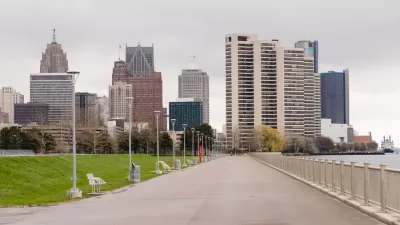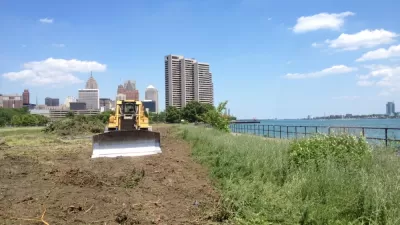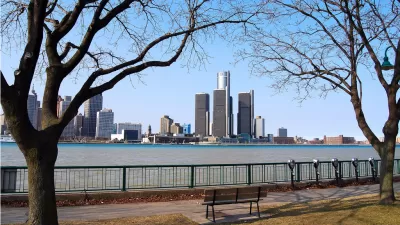The market and construction costs are taking a toll on development ambitions in Detroit.

The Michigan Opera Theatre had hoped to develop a 480-foot high-rise on property it owns in downtown, but after releasing a request for proposals in April 2019, the project has been quiet. This week, that silence turned into an indefinite delay, according to an article by Kirk Pinho.
Erica Hobbs, communications manager for Michigan Opera Theatre, released a statement citing market conditions as the reason for scrapping the development plans.
"Michigan Opera Theatre's April request for proposals said it wants to increase revenue through a ground lease of the property and increase the revenue brought in by its 700-space parking deck built in 2005," according to Pinho.
The defunct 34-story builing would have been built on an 0.8-acre surface parking lot located "next to the Detroit Opera House and the seven-story Detroit Opera House Parking Center at the corner of Broadway and John R streets."
Pinho also notes that several other buildings planned for Detroit's downtown have been either scaled back this month. Earlier this week, "Bedrock LLC CEO Matt Cullen revealed that Dan Gilbert's planned tower on the site of the former J.L. Hudson's department store building would not be the tallest building in the state, as it had been planned for nearly three years." Reports that Bedrock would reduce the height of that project have been public since August, however. Earlier in the month, developers scaled back plans for The Mid, a $377 million condo project located on Woodward Avenue in Midtown.
FULL STORY: MOT halts proposed high-rise next to Detroit Opera House downtown

Alabama: Trump Terminates Settlements for Black Communities Harmed By Raw Sewage
Trump deemed the landmark civil rights agreement “illegal DEI and environmental justice policy.”

Planetizen Federal Action Tracker
A weekly monitor of how Trump’s orders and actions are impacting planners and planning in America.

The 120 Year Old Tiny Home Villages That Sheltered San Francisco’s Earthquake Refugees
More than a century ago, San Francisco mobilized to house thousands of residents displaced by the 1906 earthquake. Could their strategy offer a model for the present?

In Both Crashes and Crime, Public Transportation is Far Safer than Driving
Contrary to popular assumptions, public transportation has far lower crash and crime rates than automobile travel. For safer communities, improve and encourage transit travel.

Report: Zoning Reforms Should Complement Nashville’s Ambitious Transit Plan
Without reform, restrictive zoning codes will limit the impact of the city’s planned transit expansion and could exclude some of the residents who depend on transit the most.

Judge Orders Release of Frozen IRA, IIJA Funding
The decision is a victory for environmental groups who charged that freezing funds for critical infrastructure and disaster response programs caused “real and irreparable harm” to communities.
Urban Design for Planners 1: Software Tools
This six-course series explores essential urban design concepts using open source software and equips planners with the tools they need to participate fully in the urban design process.
Planning for Universal Design
Learn the tools for implementing Universal Design in planning regulations.
Clanton & Associates, Inc.
Jessamine County Fiscal Court
Institute for Housing and Urban Development Studies (IHS)
City of Grandview
Harvard GSD Executive Education
Toledo-Lucas County Plan Commissions
Salt Lake City
NYU Wagner Graduate School of Public Service





























